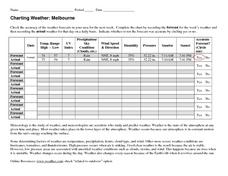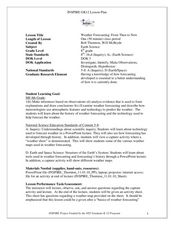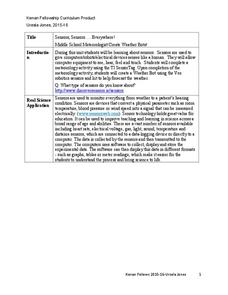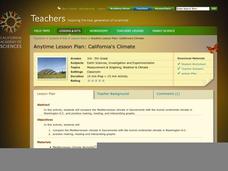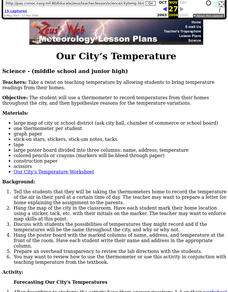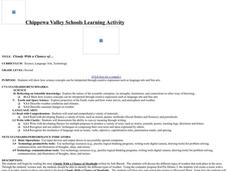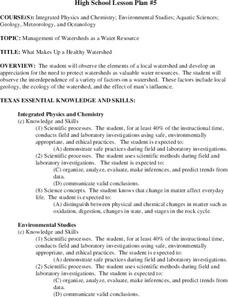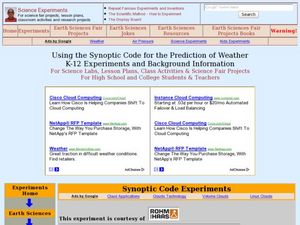American Museum of Natural History
Tornadoes Spinning Thunderstorms
Tornado winds can reach more than 200 miles per hour. Learners explore wind speeds and more characteristics of tornadoes with an online lesson. They learn how tornadoes form and how scientists attempt to predict them. Can be used as an...
NASA
Write the Book on Weather Metrics
It's not easy to measure the weather. Pupils learn about what all weather has in common—the atmosphere. Scholars discover how a meteorologists must be able to measure aspects of the atmosphere and decipher the data. They then create a...
Curated OER
Weather Watchers
Students study basic meteorology concepts. They build a simple barometer to measure air pressure. They explore the concepts of relative humidity, air convection currents and temperature inversions and to discover their connection to...
Curated OER
Floods
Students explore Earth science by answering study questions on-line. In this natural disasters lesson, students research Australia flood statistics over the past 40 years and identify patterns. Students utilize the web to view...
Curated OER
Meteorology Madness
Students probe the dynamic weather changes through several hands-0n activities in this seven lessons unit. The hydrologic cycle, clouds, atmosphere, air movement, fronts, and forecasting form the components presented in this unit.
Curated OER
Moisture Advection
Students analyze meteorological data and arrive at conclusions using animations of dewpoint temperatures and winds. They view an animation and determine the preferred location(s), if any, for the advection of moisture into the state....
Curated OER
You Can Be A Woman Meteorologist
Students complete four activities that are about meteorology. The first activity is for them to explore weather maps. The second activity is for students to discover high-pressure and low-pressure air. The third activity is for them to...
Curated OER
Charting Weather: Melbourne
In this earth science worksheet, students check the accuracy of the weather forecasts in their area for a week. Then they complete the chart by recording the forecast for the week's weather and then recording the actual weather for that...
Curated OER
Weather Forecasting: From Then to Now
Eighth graders review the history of weather forecasting. In this earth science instructional activity, 8th graders identify the different tools used in forecasting weather. They explain why it's important to know the weather.
Curated OER
Creating Weather Journals
Students create weather journals. For this weather science lesson, students use digital cameras to record the daily weather and write a paragraph in a weather journal.
Curated OER
Weather Patterns
Students research to determine weather patterns and natural hazards most likely to affect their region.
Curated OER
Fahrenheit vs Celsius
Students construct a thermometer and convert Fahrenheit temperature into Celsius temperature. In small groups, they construct a thermometer, write a paragraph describing how to make a thermometer, and convert temperatures.
Curated OER
Ancient Sun Models of the World
Students explain that many different cultures across the world developed their own reasoning for the weather around them. They explore the different cultural beliefs of the sun's cycle and to create their own story of the sun's movement.
Curated OER
Our Eye in the Sky: The TIROS Weather Satellite
Students investigate the political context of the creation of a weather satellite. For this technology and society lesson, students explore the historical, technological, and political context of the TIROS weather satellite. They write a...
Curated OER
Weather Predictions
Students record weather data and create a five day forecast. Students investigate the roles of meteorologists and identify symbols used on a weather map. After gathering weather data for a week, students will create a five day forecast...
Curated OER
Science Fiction
Students write a science fiction story. In this science fiction lesson, students read selections of science fiction and compare them to supernatural stories from the Bible. Students identify themes and discuss elements that are common...
Kenan Fellows
Sensors, Sensors…..Everywhere! Middle School Meteorologist Create Weather Bots!
My forecast is that you'll want to use the resource. Pupils design and create a weather bot as part of a project-based unit. These bots should be able to measure temperature, humidity, barometric pressure, wind speed and direction, and...
California Academy of Science
California's Climate
The United States is a large country with many different climates. Graph and analyze temperature and rainfall data for Sacramento and Washington DC as you teach your class about the characteristics of Mediterranean climates. Discuss the...
Curated OER
Our City's Temperature
Middle schoolers use a thermometer to record temperatures from their homes throughout the city, and then hypothesize reasons for the temperature variations. They use a weather graph worksheet that's imbedded in this lesson to orgainize...
Curated OER
Measuring Cloud Coverage
Students explore Earth science by completing weather symbol worksheets. In this cloud identification lesson, students identify the different types of clouds in the sky and how they are formed. Students complete a cloud measurement...
Curated OER
X-Storms
Learners compare and contrast 3 types of extreme storms. They obtain real-time and historical meteorological data regarding 2 specific storms and then analyze the data to determine what type of storm each was.
Curated OER
Cloudy With a Chance of...
Second graders will write a story. In this writing and meteorology activity, 2nd graders read the story Cloudy With a Chance of Meatballs, then use KidPix to create a weather picture. The picture is imported into a word processor and the...
Curated OER
What Makes Up a Healthy Watershed
Learners, after observing the elements of a local watershed, explore the need to protect watersheds as water resources for the future. They examine the factors involved with a watershed: geology, ecology, and the effect of man's...
Curated OER
Using the Synoptic Code for the Prediction of Water
Students construct a thermoscreen for the experiment. In this earth science lesson, students make observations and interpret them using synoptic codes. They predict the weather based on gathered information.









